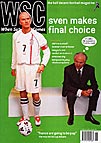 As the Premier League indulges in its tenth birthday cake, the gulf in class between the top flight and the rest of the Football League has stretched almost beyond repair
As the Premier League indulges in its tenth birthday cake, the gulf in class between the top flight and the rest of the Football League has stretched almost beyond repair
At the time of going to press it seems that a new Premiership record will be set this season – and, as the ridiculous fuss over Alan Shearer’s 200th goal since 1992 shows, those are the kind of records that count these days. This season, the tenth since football began, is almost certain to be the first that all of the promoted teams have succeeded in staying in the Premiership.
However, like pass completion ratios, shots off target and so many of the other statistics that wash over the sports pages and infest the TV coverage of today’s football, this one is all but meaningless. For while Bolton, Blackburn and Fulham are set to survive, the three clubs that are going down represent an even more chilling example of the changing balance of power in the top division.
In the past few years Derby, Leicester, Ipswich and Sunderland (the final place is undecided at the time of writing) have all been touted as the model for other promoted teams. Leicester prospered in the Premiership despite coming up through the play-offs and seemed to have hung on long enough to Martin O’Neill to pave the way for a successful succession. Derby, who came up with their east midlands neighbours in 1996, managed the transition to a new stadium which boosted their crowds and seemed to have the resources to go higher after finishing ninth in 1998 and eighth the following year.
And what applies to Derby goes doubly for Sunderland, whose ground is now the third biggest in the country and who have finished seventh in each of the past two seasons. Ipswich’s rise was quicker and even more spectacular, but so has been their fall. When Man City were relegated last season after losing to Ipswich, the Manchester Evening News commented: “How ironic that City’s long-suffering fans should finally be put out of their lingering relegation misery by a side that came up alongside them last season. Ipswich ought to be held up as shining example of what can be done if a solid base has been built both on and off the pitch.” But now now they are back to square one.
In one sense, of course, this kind of volatility is a good thing. It seems healthy that a club that finishes fifth one season can go down the next. But the inability of promoted teams to stay the course and go on to improve further is the most damning indictment of the imbalance in the division. It’s not just that a team is never going to win the league in their first season up, as Nottingham Forest did in 1978, or even their second, as Leeds did in 1992. More worrying is that it seems increasingly difficult to establish a bridgehead for a few years and then go on to challenge for trophies, or even Champions League entry.
In the decade before the Premiership began, all of the following clubs finished in the top three: Watford, Southampton, Nottingham Forest, West Ham, Crystal Palace and Sheffield Wednesday. Norwich did it in the Premiership’s first season. All except Forest had been promoted within the previous five years. Since 1992, only Newcastle have come up and established themselves, though even they have spent as much time in the bottom half of the table as the top. And their promotion was right at the start of the Premiership era, before the financial inequalities had hardened into what seems to be near-permanence.
By contrast, nine clubs have been in the Premiership ever since it began. Of those, only Everton and Southampton have regularly been in serious danger of relegation. So while attention has rightly focused on the effects of the Champions League money on those clubs that get into it on a regular basis, there seems to be another phalanx of clubs forming behind them who may not have it in them to win the league, but are highly unlikely ever to be relegated either. For what is equally noticeable about the pattern of ups and downs since 1992 is that no club has been relegated of a sufficient size to cause more than a slightly raised eyebrow. No Man Utd or Spurs, of course, as in the 1970s, but no Aston Villa, Chelsea, West Ham or Leeds either, all regular visitors to the lower reaches in the two decades before the Premiership.
It may take a financial crisis of a larger nature even than the ITV Digital mess to shake this apparent stability, as it surely needs to be shaken. The plunge of a large, Champions League-aspirant club, perhaps, that has accumulated frightening debts just as the revenue from television has peaked. We would not wish humiliating financial collapse on any person or club, of course. But at least it would make things more interesting.
From WSC 184 June 2002. What was happening this month